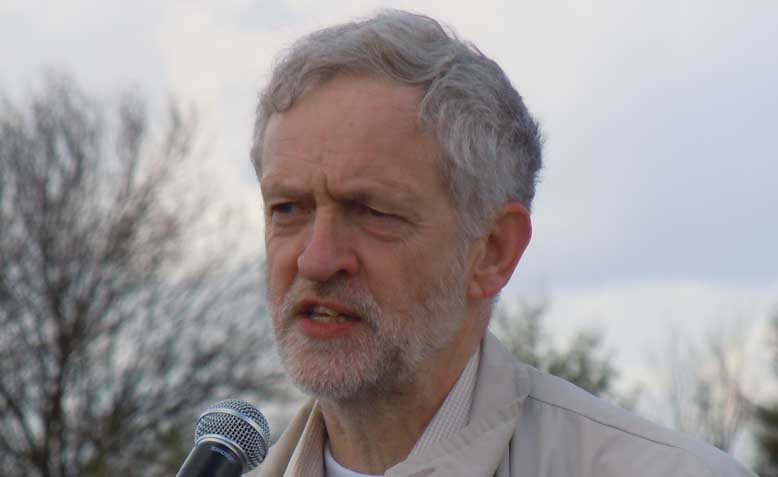 Jeremy Corbyn MP speaks at anti-drones rally, 27 April 2013. Photo: Stop War
Jeremy Corbyn MP speaks at anti-drones rally, 27 April 2013. Photo: Stop War
The media have used the Skripal affair as a stick to beat the left and the anti-war movement, argues Chris Nineham
The Skripal affair has generated a frenzy against anyone who is critical of British foreign policy. And it is worth considering its dynamics. A slew of journalists and bloggers have gone from backing Theresa May’s unwarranted certainty about Putin’s guilt and attacking Corbyn over Russia to a series of false accusations against the Stop the War Coalition – some familiar, some novel.
The Sunday Times carried two articles last weekend, including an editorial, claiming that Stop the War ‘refuses to condemn Russian military support for Assad’ and that it supported Russian military intervention in the Ukraine. This is all despite the fact that Stop the War has consistently condemned Russian foreign interventions which have contributed to the devastation in a number of the world’s theatres of war.
Over at the Observer Andrew Rawnsley argued that Corbyn’s involvement with Stop the War proved that what he calls ‘the old muscle memory of wanting to defend Russia against the west’ lingers on. Blairite blogger Dan Hodges took things to an altogether new level on Tuesday with the on-air claim that Stop the War was funded by the Kremlin!
The briefest online check is enough to prove the fantasy nature of these claims. A Stop the War statement on the Ukraine crisis from 2014 calls unambiguously for a diplomatic solution and explicitly opposes all foreign intervention.
Stop the War has repeatedly opposed Russian intervention in Syria as well as bombings by Assad’s forces. Not surprising really, it is an anti-war organisation whose view is, in the words of one of these statements,‘that external interference has no part to play in resolving the problems in Syria or elsewhere in the Middle East.’
Meanwhile, Dan Hodges retrospectively tried to back up his bizarre claim that Stop the War has actually been funded by the Kremlin by referring to a Sunday Times article which though itself is full of distortions, didn’t even mention that possibility.
Fake News
Throughout the Skripal affair, proper journalistic procedure has been turned on its head. Those making unsubstantiated claims have been supported without question, those calling for care and proper investigation have been lambasted as suspect or worse.
As Jeremy Corbyn and most critics of Theresa May’s position have said, it may well be that the Russian state is connected to the horrible attack on the former British spy Sergei Skripal and his daughter Yulia. Their point is that it is unconfirmed. But, despite the fact that she has not produced definitive evidence to prove the attack was linked to the Kremlin, and despite the statements from a range of experts in various related fields warning against a rush to judgement, Theresa May is certain, and so are most of the journalists.
Such a departure from basic journalistic norms requires some explanation and it is not hard to find. The extent to which journalists have abandoned their critical faculties let alone fact checking is an indication of how politicised the whole furore around the Skripal incident really is. What should in fact be a central story is that the affair has been quite brazenly used by politicians, journalists and commentators who are hostile to Jeremy Corbyn in general and to his foreign policy in particular to attempt to undermine him and his supporters and to discredit their political positions.
It is extraordinary, for example, that virtually no mainstream journalist has pointed out that nearly all the thirty five Labour MPs who signed the Early Day Motion opposing Jeremy Corbyn’s response to the Skripal affair are serial and committed opponents of his. Amazing too that no one has commented that they are almost all strong supporters of the current interventionist foreign policy that the clear majority of people in this country now regard as dangerous and discredited.
Amongst the thirty-five Labour rebels, all of those who were present voted for the Iraq War in 2003 and all thirty-three who voted on the question, opposed an inquiry into that disaster. All of those who were present (twenty-three) voted for the bill that led to the bombing of Libya. And most also defied Ed Miliband and voted for bombing Syria in 2013.
Co-ordination
This isn’t just proof of a failure of journalism, it is evidence of a body of opinion makers inside and outside parliament who are prepared to support each other in ignoring and distorting facts for political ends. And their actions, undesirable in themselves, could hardly be more irresponsible given the geopolitical context. They are doing their best to stir up anti-Russian hype at a time when the Western powers are already nearer to confrontation with Russia than at any time since the end of the Cold War. In the last few years Russian and Western fighter planes have been bombing in Syrian airspace on opposite sides of a war they are both enflaming. In Eastern Europe and the Balkans, steady NATO expansion eastwards has helped to create a series of flashpoints. In Central Asia, the West is scrambling for influence and control in the post-Soviet states along Russia’s southern border which contain some of the largest oil and gas reserves on the planet.
Nothing could illustrate more clearly that foreign policy is not safe in current hands. It is very important that we stand firm against the hysteria over the Skripal affair and recognise it for what it is – an orchestrated attempt by supporters of a warlike foreign policy to intimidate their opponents. Why is this frenzy happening now? Because we are closer than at any time in living memory to a real change of course in foreign affairs. To make it happen we will have to have the courage to face down our opponents and to keep on pushing.

